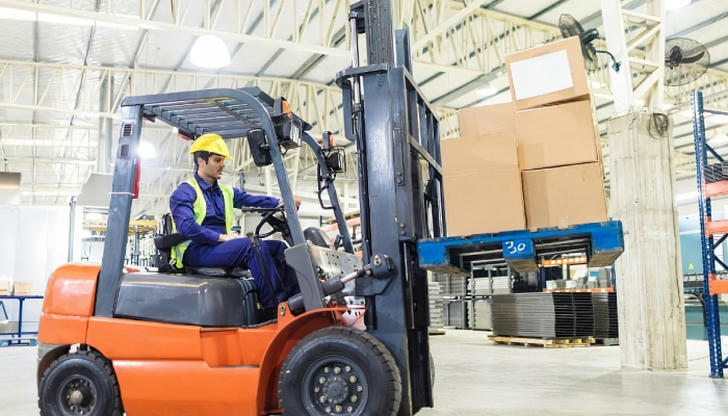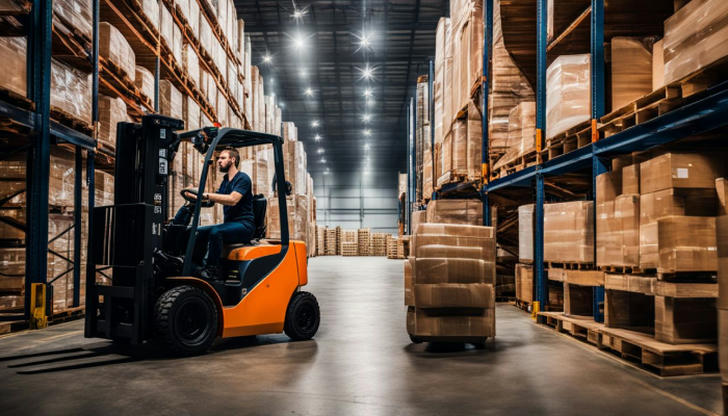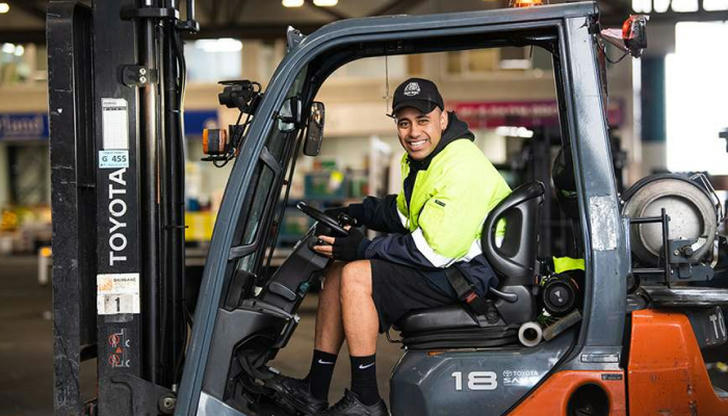The Growing Demand for Forklift Operators
In recent years, the demand for skilled forklift operators has surged, largely due to the rapid growth of industries like e-commerce, manufacturing, and logistics. Forklifts are crucial in warehouses, distribution centers, and factories, helping to move heavy goods safely and efficiently. As more companies expand their operations to meet increasing consumer demand, the need for experienced forklift operators has never been greater.
The Role of Forklift Operators

Forklift operators are responsible for safely and efficiently transporting goods within warehouses or manufacturing plants. Their role involves using a forklift to move pallets, crates, and other materials, ensuring they are placed in the correct locations or loaded onto trucks for delivery.
Loading and Unloading
One of the primary responsibilities of a forklift operator is loading and unloading materials from delivery trucks. This task requires attention to detail, as it’s essential to ensure that items are stacked securely to avoid damage. For example, a forklift operator at a large e-commerce warehouse might be tasked with unloading pallets of electronics from delivery trucks and moving them to a staging area where they will be sorted for distribution.
In a real-life scenario, a logistics company might experience high shipping volumes during the holiday season, meaning forklifts are used around the clock to unload thousands of packages from trucks and move them to designated areas. Efficiency and safety are key to meeting deadlines and ensuring the correct products are sent to the right locations.
Storing and Organizing Materials
Another significant part of a forklift operator’s job is to organize and store materials in the warehouse. Forklifts are used to place products in specific locations, ensuring easy access for picking and shipping. Operators must follow a set system to place goods in locations that minimize the time required to retrieve them when needed.
For example, at a food distribution warehouse, forklift operators must ensure that perishable items are placed in refrigerated sections of the warehouse, while non-perishable goods are stored in dry areas. Organizing materials in a way that maximizes space and efficiency is crucial for smooth operations.
Quality Control and Safety
Forklift operators are also responsible for ensuring that the materials they handle are free of damage. Before moving goods, they are expected to inspect pallets, crates, or other containers for any visible signs of damage that could affect the product or cause accidents. This involves checking the condition of both the goods and the equipment.
An example of this would be a forklift operator at a construction site, where they may be tasked with transporting heavy building materials. The operator needs to ensure that the equipment they use is in good working condition and that the materials being moved are not damaged, as this can lead to significant delays and additional costs.
Forklift Operator Recruitment: Key Requirements

When hiring forklift operators, employers typically look for certain qualifications and skills to ensure that candidates can perform the job effectively and safely. While many employers don’t require a college degree, there are other important qualifications that are considered essential.
Certification and Training
In many regions, forklift operators are required to hold a valid forklift certification. This certification demonstrates that the operator has been properly trained in forklift operation and understands the safety regulations associated with the job. In the U.S., for example, the Occupational Safety and Health Administration (OSHA) mandates that forklift operators undergo training and pass an evaluation before they are allowed to operate machinery.
In practice, many companies offer in-house training programs to help new hires obtain certification. For instance, a warehouse company might provide a two-week training program that covers both theoretical knowledge and hands-on practice, ensuring operators understand how to use the forklift safely and efficiently.
Experience
Experience is another important factor when recruiting forklift operators. While entry-level candidates may be considered, employers often prefer those with prior experience operating forklifts in a similar environment. Experienced forklift operators tend to be faster, more efficient, and more adept at troubleshooting problems on the job.
For example, a manufacturing plant may require forklift operators who are familiar with operating different types of forklifts, including electric and propane-powered models. This experience is crucial for ensuring that operations run smoothly and that operators can adapt to different situations quickly.
Physical Fitness and Stamina
Forklift operation is a physically demanding job. Operators often need to be on their feet for long hours, sometimes lifting heavy materials by hand or using the forklift to move bulky loads. As such, physical fitness and stamina are important considerations when hiring.
At large warehouse operations, forklift operators may need to maneuver the forklift through narrow aisles, which requires both physical coordination and the ability to make quick decisions. Employers may look for candidates who are capable of handling the physical demands of the job, which can include lifting and carrying items, as well as staying alert for long shifts.
Attention to Detail and Safety Awareness
Forklift operators must demonstrate a high level of attention to detail. They are responsible for ensuring that goods are safely transported and stored, and that the forklift is used correctly. A small mistake can lead to costly accidents, including damage to goods, equipment, or even injury to colleagues.
An example of this can be seen in the case of a warehouse that handles fragile electronic products. Forklift operators must be aware of the fragile nature of these products and take extra care to ensure they are moved gently and stored securely. Employers value candidates who can demonstrate a strong commitment to safety and attention to detail in their work.
The Forklift Job Market: Trends and Opportunities

The forklift operator job market is showing promising growth, particularly in industries such as e-commerce, logistics, and manufacturing. As more companies embrace automation, the demand for skilled forklift operators remains high.
E-commerce Boom
The rapid growth of e-commerce has created a large number of job opportunities for forklift operators. As online shopping becomes increasingly popular, businesses need efficient warehouse systems to handle the flow of goods. Forklift operators are crucial to ensuring that products are delivered to customers on time.
For example, companies like Amazon have invested heavily in their fulfillment centers, creating thousands of jobs for forklift operators. These companies often recruit year-round, especially during peak seasons like the holidays. Forklift operators in these settings may work alongside automated systems, but human operators remain essential for more complex tasks.
Warehouse Automation and Technology
While automation is changing the face of many industries, it has not eliminated the need for forklift operators. On the contrary, the introduction of automated machinery has shifted the role of the forklift operator towards a more technical and skilled job. Operators are now required to handle both manual forklifts and operate automated guided vehicles (AGVs).
For instance, some advanced warehouses use robotics to move goods from one place to another. However, forklift operators are still needed to ensure that goods are properly stored, retrieved, and transported to the right locations. As a result, employers are looking for candidates who can work with both traditional and modern machinery.
High Demand in Manufacturing and Construction
Manufacturing and construction industries continue to provide strong job prospects for forklift operators. In these sectors, forklift operators are essential for transporting raw materials, components, and finished products within plants and job sites. With construction booming in many urban areas, the need for forklift operators to transport heavy equipment and building materials has remained steady.
For example, a construction company working on a high-rise project may require forklift operators to move large loads of steel beams or concrete blocks from one location to another. The physical demands of this type of work, coupled with the need for careful handling of expensive materials, make experienced forklift operators highly sought after.
The Hiring Process: What to Expect

The hiring process for forklift operators typically involves several key steps. Once an applicant is identified, employers may require them to complete a skills assessment or a forklift driving test. This ensures that candidates are capable of safely operating the machinery and performing the necessary tasks.
For example, a logistics company may require candidates to demonstrate their ability to drive a forklift in a simulated environment. During this assessment, they might be asked to complete tasks like lifting and stacking boxes or maneuvering through tight spaces. The goal is to evaluate the candidate’s practical skills and ensure they are fit for the role.
Additionally, employers may conduct background checks to ensure that candidates have a clean driving record and no history of accidents or violations. Forklift operators must be reliable and responsible, as safety is a top priority.
Conclusion
Forklift operator jobs play an essential role in the smooth operation of warehouses, distribution centers, and manufacturing plants. With the rapid growth of e-commerce and manufacturing, the demand for skilled forklift operators continues to rise. However, recruitment for these positions remains challenging due to the physical demands of the job, high turnover rates, and the need for specific qualifications.
For those interested in pursuing a career as a forklift operator, there are numerous opportunities in a variety of industries. Gaining certification, building experience, and developing a strong work ethic can help candidates secure a rewarding and stable position in this growing field.
